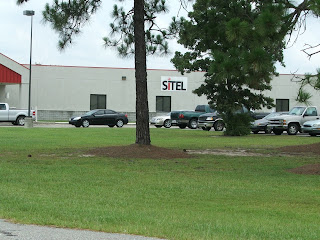For the first time in more than a decade, Bogalusa will be without a customer service call center when the new work week gets under way.
Earlier this year, officials for Nashville-based Sitel notified Washington Economic Development Foundation director Ryan Seal that it would cease operations in the Bogalusa Industrial Park on Monday, July 18.
At the time, Sitel employed 149 people — the majority in $8 to $9 per hour pay range. When the announcement was made, facility coordinator Chad Luikart said employees would be given the opportunity to transfer to other Sitel sites — the nearest being in Starkville, Miss.
Attempts to contact Luikart were unsuccessful and Human Resources Manager Jerry Couch did not return an earlier call.
Both Seal and Bogalusa Mayor Charles Mizell have told wpnewsblog they are working “on a deal that will be great” for the community and hope to make an announcement soon.
Sources tell wpnewsblog there is a team of about 20 persons who will stay until July 25 in the shutdown process, but that the remainder of the workforce would finish employment on Monday. At about 7 p.m. Friday, there were seven vehicles in the parking lot and, at noon Saturday there were 18 — with five bearing Mississippi plates. While the majority of the hourly workers and first-line supervisors reside in Washington Parish, there have always been a number of employees from the Tylertown, Dexter, Sandy Hook, Foxworth and Columbia areas.
“Who can transfer for what they pay?” a supervisory employee who requested anonymity at the time, asked. “People making $8 an hour can’t afford to move and they sure aren’t going to pay for it. The coaches (team leaders) don’t make a lot more than the customer service reps.”
Seal said the decision did not surprise him, as he had been notified three previous times that the company was considering closing the Bogalusa facility.
Seal told wpnewsblog that Sitel cited several factors in reaching the decision, including the national economy, the lack of Spanish-speaking employees, the location of the call center in a hurricane zone and the distance from a commercial airport.
“I think the fact we were nearing the end of their agreement also played a factor, although they wouldn’t admit that,” Seal said. “They had raised some questions about the requirements and things like that a few months ago.”
One of the conditions of the company’s contract with the city — going back to when the facility was new — was that a workforce of 300 be maintained.
And an educated, dependable workforce was one of the problems in Bogalusa.
“You have to show up for work,” a floor coach told a training class last September. “You said you wanted to work and we hired you and scheduled you, so you have to show up.”
That class of 16 was down to 13 being the six-week training period was up and only four remained at the end of January.
“Turnover is a problem,” trainer Janet Cotton told the September class. “The churn is more than 100 percent.”
The $3 million facility housing Sitel was constructed for what was then known as Service Zone in 2000 and 2001. Service Zone, a Florida-based call center, had been located in a former retail space in Shopyard Square before relocating to the Industrial Park in September 2001.
In March 2002, the state reimbursed the city’s Industrial Park Fund to the tune of $1.5 million — it’s share of the cost of the project. At the time, Service Zone employed 346 people and planned to add between 80 and 100 over the next two months.
Louisiana Secretary of Economic Development Don Hutchinson said at the time that the state was focusing on bringing in what he described as “technology jobs.”
In January 2004, ClientLogic acquired Service Zone’s operations, including Bogalusa, but by summer things weren’t looking very promising as the company announced it had lost its only contract (for the Bogalusa operation) and would likely lay off its entire workforce — which, by this time, was below 300. Things turned around, though, when the company announced it had acquired three, and possibly, four contracts for Bogalusa.
The company continued to push for growth in its Bogalusa operations, but ran into problems.
In April 2005, the company announced it was having difficulty meeting its goal of hiring 375 new workers by July because of a lack of computer and customer service skills in the local workforce. The company’s director of operations even went before the Washington Parish Council to seek out qualified workers.
Darlene Larkin said only about half of the 50 applicants the company received daily were qualified, but that there was a 50 percent failure rate when those were tested for employment.
Then came Hurricane Katrina. The company shuttered its Bogalusa operations after the storm hit on Aug. 29, 2005, but reopened three weeks later, although not with the pre-storm workforce of 350.
By mid-September 2006, the company announced it was planning to add 60 jobs in October and an additional 100 by the end of the year. To reach those goals, the company announced it would offer referral bonuses and sign-on bonuses. In addition, to emphasize its recommitment to Bogalusa, the company planned a grand reopening.
In February 2007, ClientLogic had merged with Sitel and the workforce was now down to 240 persons. ClientLogic’s starting wage was $7 per hour with increases to $9 after about 18 months, Larkin had explained.
Bogalusa’s Sitel operations had a single client, Citizens Bank Group, a division of the Royal Bank of Scotland.


No comments:
Post a Comment
Comments that are not on topic will not be published.